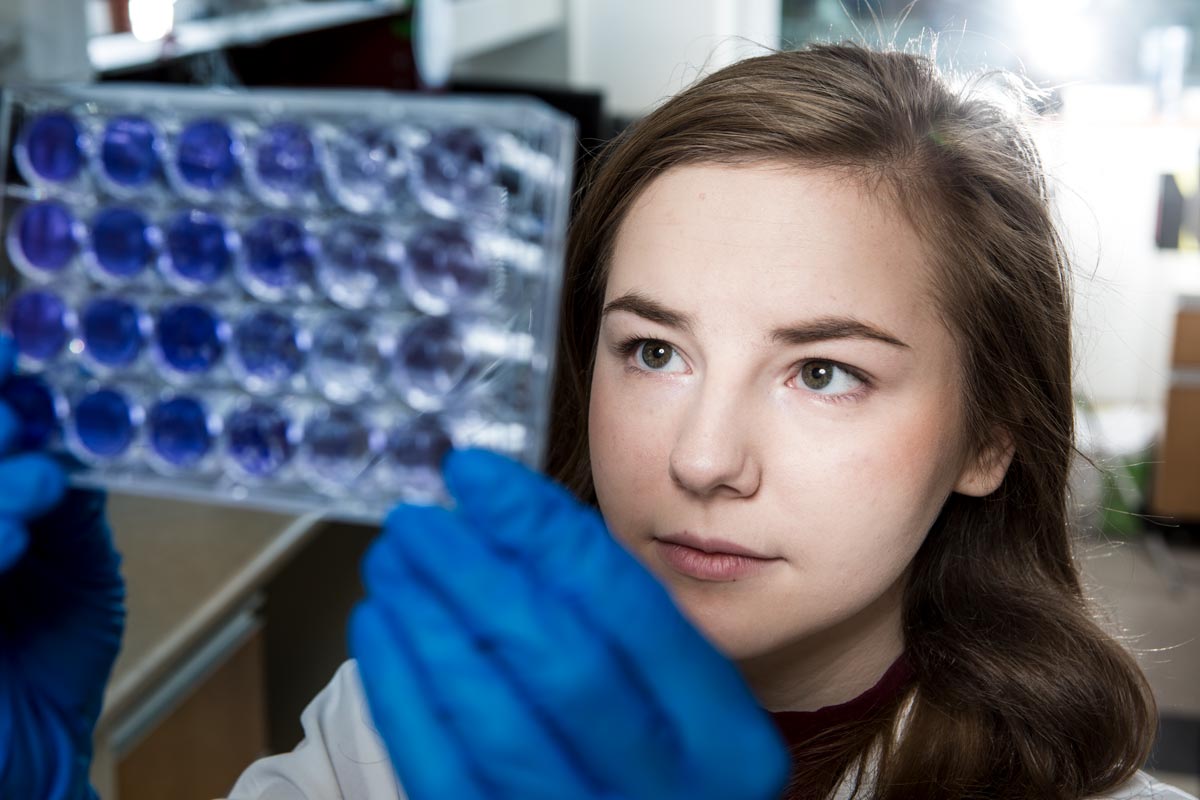
For Iryna Stryapunina, a combination of theoretical knowledge and lab work experience is what will help her transition seamlessly from the Faculty of Science into Harvard. (Credit: Faculty of Medicine and Dentistry)
"Because the Faculty of Science provided me with theoretical knowledge as well as with lab work experience, I will be able to transition seamlessly into the graduate program at Harvard," says Iryna Stryapunina. "My experience with the Faculty of Science was overwhelmingly positive."
Congratulations to one of our newest alumni. Iryna Stryapunina is an outstanding student who was involved with the debate society, as well as with Zika virus research during her undergraduate career.
Stryapunina tells us about her undergraduate journey at the University of Alberta and shares some advice for future Faculty of Science students.
What brought you to the University of Alberta?
I completed high school in Edmonton, so I was always acquainted with the University of Alberta. The U of A became an integral part of my life since attending conferences, science competitions, and debate tournaments on campus while I was in grades 10, 11, and 12.
From the development of lamivudine (an antiretroviral medication used to prevent and treat HIV/AIDS) for treatment of hepatitis B by professor Lorne Tyrrell (professor in the Department of Medical Microbiology & Immunology), to the development of the Edmonton Protocol to transplant pancreatic islets as a treatment for Type 1 diabetes, amazing scientific discoveries played an important role in my decision to be part of the U of A.
How was your experience at the Faculty of Science?
My experience with the Faculty of Science was overwhelmingly positive. I got to do so many cool things in my classes such as making yogurt out of Lactobacilli, putting Drosophila to sleep, dissecting a fish, finding fossils in the Alberta badlands, and mutating the Zika virus genome.
During my time at the Faculty, I discovered that I'm fascinated with viruses, and I've now decided that I want to spend the rest of my life learning more about them.
What resonates the most with you about your experience at the Faculty of Science?
The mentorship I received has been the most impactful aspect of my time with the Faculty of Science. By working in a lab, I was able to join a community of scientists to whom I can now turn with any question or concern. The scientific community at the U of A is really welcoming.
Tell us about your research project on the Zika virus.
In the spring of 2016 when the Zika virus epidemic was at its peak and news outlets were publishing articles about its connection to microcephaly, I discovered that there was a lab at the University of Alberta working on the virus.
I arranged a summer research studentship with professor Tom Hobman (cell biology professor as well as a Canada Research Chair in RNA Viruses and Host Interactions) to investigate Zika virus protein interactions. During my two years in the lab, and in collaboration with a professor at the University of Toronto, I generated an interactome [an interactome is the whole set of molecular interactions in a particular cell.] showing a network of interactions of Zika virus proteins with host proteins.
Moreover, for my undergraduate thesis, I studied one of those interactions more in depth, trying to elucidate its effect on the viral replication cycle.
What future plans do you have?
So far, I have figured things out only as far as my PhD-I'm going to Harvard.
I applied to the PhD in virology program without expecting to get in. Within a week, I received a call inviting me for an interview weekend in Boston. The interview was a blast. I got to talk with some of the brightest minds in the field and to see what research the department was involved in.
Because the Faculty of Science provided me with theoretical knowledge as well as with lab work experience, I will be able to transition seamlessly into the graduate program at Harvard.
What advice do you have for future Faculty of Science students?
Take advantage of the opportunities that the U of A offers. My undergraduate degree would not have been the same if I hadn't surrounded myself with inspiring mentors, met amazing folks in the debate society, or found the kind of research I was absolutely in love with.